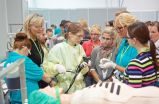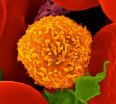NASA's MAVEN studies passing comet and its effects
2014-10-21
(Press-News.org) NASA's newest orbiter at Mars, MAVEN, took precautions to avoid harm from a dust-spewing comet that flew near Mars today and is studying the flyby's effects on the Red Planet's atmosphere.
The MAVEN spacecraft -- full name Mars Atmosphere and Volatile Evolution -- reported back to Earth in good health after about three hours of precautions against a possible collision with high-velocity dust particles released by comet C/2013 A1 Siding Spring.
"We're glad the spacecraft came through, we're excited to complete our observations of how the comet affects Mars, and we're eager to get to our primary science phase," said MAVEN Principal Investigator Bruce Jakosky of the University of Colorado, Boulder.
MAVEN began orbiting Mars on Sept. 21. The opportunity to study this rare near-miss of a planet by a comet comes during the project's commissioning phase. A few weeks of instrument calibration and orbit fine-tuning remain before the start of the primary science phase. The mission will study the upper atmosphere of Mars and its interaction with the solar wind.
Comet Siding Spring hurtled past Mars today at about 125,000 mph (56 kilometers per second), coming within about 87,000 miles (139,500 kilometers) of the planet. That is equivalent to about one-third of the distance between Earth and Earth's moon. The closest approach by the comet's nucleus came at about 11:27 a.m. PDT (2:27 p.m. EDT). The period when dust from the comet was most likely to reach Mars and the orbits of spacecraft around Mars peaked about 100 minutes later.
From about 10:45 a.m. to 2 p.m. PDT (1:45 p.m. to 5:00 p.m. EDT) MAVEN kept in a defensive posture to reduce its profile relative to the direction from which the comet's high-velocity dust particles would come. In that "hunkered down" orientation, its main antenna was not facing the right way for transmitting to Earth, so communications were maintained at low data rate via a secondary antenna. Also, the mission performed a maneuver on Oct. 2 that set its orbit timing so that the spacecraft was behind Mars, relative to the possible dust flow, from about 12:53 p.m. to 1:23 p.m. PDT (3:53 p.m. to 4:23 p.m. EDT).
Downlink of data has begun from MAVEN observations of the comet and Mars' atmosphere. Some observations are designed to provide information about the composition of the gases and dust being released by the comet. Others are investigating possible interaction between material from the comet and the atmosphere of Mars.
Three NASA Mars orbiters, two Mars rovers and other assets on Earth and in space are studying comet Siding Spring. This comet is making its first visit this close to the sun from the outer solar system's Oort Cloud, so the concerted campaign of observations may yield fresh clues to our solar system's earliest days more than 4 billion years ago.
MAVEN's principal investigator is based at the University of Colorado's Laboratory for Atmospheric and Space Physics. The university provided two science instruments and leads science operations, as well as education and public outreach, for the mission. NASA's Goddard Space Flight Center in Greenbelt, Maryland, manages the MAVEN project and provided two science instruments for the mission. Lockheed Martin built the spacecraft and is responsible for mission operations. The University of California at Berkeley's Space Sciences Laboratory also provided four science instruments for the mission. NASA's Jet Propulsion Laboratory in Pasadena, California, provides navigation and Deep Space Network support, as well as the Electra telecommunications relay hardware and operations.
INFORMATION:
For more about MAVEN, visit:
http://www.nasa.gov/maven
ELSE PRESS RELEASES FROM THIS DATE:
2014-10-21
October 20, 2014 – (BRONX, NY) – Rates of depression and anxiety vary widely among different segments of the U.S. Hispanic and Latino population, with the highest prevalence of depressive symptoms in Puerto Ricans, according to a new report from Albert Einstein College of Medicine of Yeshiva University and the Hispanic Community Health Study/Study of Latinos (HCHS/SOL). The researchers' findings also suggest that depression and anxiety may be undertreated among Hispanics and Latinos, particularly if they are uninsured. The study was published online in Annals ...
2014-10-21
Our species' waking and sleeping cycles – shaped in millions of years of evolution – have been turned upside down within a single century with the advent of electric lighting and airplanes. As a result, millions of people regularly disrupt their biological clocks – for example, shift workers and frequent flyers – and these have been known to be at high risk for such common metabolic diseases as obesity, diabetes and heart disease. A new study published in Cell, led by Weizmann Institute scientists, reveals for the first time that our biological clocks ...
2014-10-21
Bethesda, MD (Oct. 21, 2014) — If you are not getting the recommended seven-to-eight hours of sleep each night, you may be at increased risk of developing ulcerative colitis, according to a new study1 in Clinical Gastroenterology and Hepatology, the official clinical practice journal of the American Gastroenterological Association.
"Both short and long durations of sleep have important health implications and are associated with increased overall mortality, cardiovascular disease and cancer," said lead study author Ashwin N. Ananthakrishnan, MD, MPH, Massachusetts ...
2014-10-21
A team of UC San Francisco researchers has found that a tiny segment of genetic material known as a microRNA plays a central role in the transition from moderate drinking to binge drinking and other alcohol use disorders.
Previous research in the UCSF laboratory of Dorit Ron, PhD, Endowed Chair of Cell Biology of Addiction in Neurology, has demonstrated that the level of a protein known as brain-derived neurotrophic factor, or BDNF, is increased in the brain when alcohol consumed in moderation. In turn, experiments in Ron's lab have shown, BDNF prevents the development ...
2014-10-21
(Vienna, October 21, 2014) Patients with irritable bowel syndrome (IBS) may at last be able to hope for a brighter future as innovative new treatments emerge and researchers clarify the role of current therapies. Dr Alexander C. Ford from the Leeds Gastroenterology Institute in Leeds, UK, tells journalists attending the 22nd United European Gastroenterology Week (UEG Week 2014) in Vienna, Austria, that significant progress was being made in drug development for IBS, thanks to the intense research efforts of scientists around the world. "Researchers have dedicated many years ...
2014-10-21
A new study shows that survival and neurological outcomes for patients in cardiac arrest can be improved by adding extracorporeal membrane oxygenation (ECMO) when performing cardiopulmonary resuscitation (CPR). The study abstract was released today in an online supplement of the journal CHEST and will be presented at CHEST 2014, the annual meeting of the American College of Chest Physicians in Austin, Texas held October 25-30.
Despite advances in medical care, less than 20% of people who experience a cardiac arrest make a full recovery. An alternate approach to traditional ...
2014-10-21
PROVIDENCE, R.I. [Brown University] — Scientists think of CD8 T cells as long-lived cells that become tuned to fight just one pathogen, but a new study finds that once CD8 T cells fight one pathogen, they also join the body's "innate" immune system, ready to answer the calls of the cytokine signals that are set off by a wide variety of infections.
Think of CD8 T cells as soldiers who are drafted and trained for a specific mission, but who stay in service, fighting a variety of enemies throughout a long career.
CD8 T cells therefore have more utility than researchers ...
2014-10-21
Eliminating subsidies that help low- and moderate-income people purchase coverage through government-run health insurance marketplaces would sharply boost costs for consumers and cause more than 11 million Americans to lose their health insurance, according to a new RAND Corporation study.
Modeling the likely effects of ending subsidies offered to individuals under the federal Affordable Care Act, researchers found that such a move would increase premium costs in the individual marketplaces by as much as 43 percent and cause enrollment to drop by 68 percent.
"If subsidies ...
2014-10-21
Two Michigan high school students, sisters Ilina and Medha Krishen, have developed screening tools using electronic stethoscopes to detect lung and heart disease. The sisters will present their findings at CHEST 2014 in Austin, Texas next week.
Ilina Krishen became aware of the dangers of smoking and chemical air pollution when she saw the effects of lung disease on family members. Curious to find a way to detect early lung damage in people exposed to noxious air pollutants, Ilina, a high school senior at Port Huron Northern High School in Michigan, developed a screening ...
2014-10-21
Adults typically believe that life gets better — today is better than yesterday was and tomorrow will be even better than today. A new study shows that even depressed individuals believe in a brighter future, but this optimistic belief may not lead to better outcomes. The findings are published in Clinical Psychological Science, a journal of the Association for Psychological Science.
The research shows that middle-aged adults who had a history of depression tended to evaluate their past and current lives in more negative terms than did adults without depression, ...
LAST 30 PRESS RELEASES:
[Press-News.org] NASA's MAVEN studies passing comet and its effects


